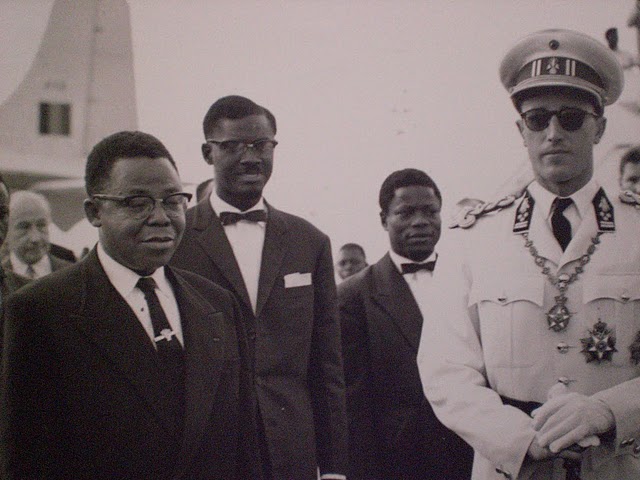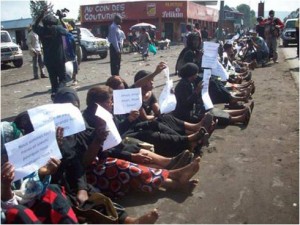The Anti-Imperialist Congo: 50 years since the death of Lumumba
The Anti-Imperialist - Posted on Monday, January 24, 2011 0:03 - 1 Comment
By Adam Elliott-Cooper
“Our wounds are too fresh and too painful still for us to drive them from our memory. We have known harassing work, exacted in exchange for salaries which do not permit us to eat enough to drive away our hunger, or to clothe ourselves, or house ourselves decently, or to raise our children as creatures dear to us… For though this independence of the Congo is today being proclaimed in a spirit of accord with Belgium, a friendly country with which we are dealing as one equal to another, no Congolese worthy of the name can ever forget that we fought to win it [applause]… We are proud of this struggle amid tears, fire, and blood, down to our very heart of hearts, for it was a noble and just struggle, and indispensible struggle, if we were to put an end to the humiliating slavery that had been forced on us”
At the official handover of power from Belgium to Congo, Patrice Lumumba, in the presence of numerous Belgian statesmen, made this response to King Baudouin’s speech, who halied the “genius of King Leopold II”, the original owner of what was called the Congo Free-State. Lumumba was the only anti-colonial leader with widespread support among the poor in Congo at the time. A year later, Lumumba was assassinated in a plot hatched by the CIA and carried out by the Belgians. This year is the 50th anniversary of Lumumba’s untimely death – half a century which has delivered neo-colonial riches to the west, while funding Africa’s first World War.
Five years after Lumumba’s assassination, Sésé Seko Mobutu became president of Zaire (now Congo), reigning as the authoritarian head of state for other 30 years. Mobutu was on the payroll of the CIA for many years before Washington supported his rise to leadership. In return for CIA support, Mobutu promoted US interests in central Africa during the Cold War. Mobutu’s loyalty to the US went as far as supporting the South African army which was defending its system of apartheid. Mobutu sent commandos and armoured cars to support South African troops in Angola and committed another four battalions of paratroopers. The troops that Mobutu sent were fighting the Marxist-inspired MPLA. However, after Cuban troops (mainly Afro-Cubans) joined the MPLA, South Africa and its allies were defeated.
Another reason for US support for Mobutu was the vast mineral resources in the Congo. Under the regime, US multinationals accessed the resources they needed, and in return Mobutu instigated a regime of violent repression and corruption. By the early 1980s, Zaire’s debt stood at 30% of GDP, partly due to unfair trade agreements with the west, and partly due to Mobutu draining public funds into his personal bank accounts. In 1982, Mobutu followed US advice in accepting an IMF deal which liberalised Zaire’s economy and brought about a reversal of the previous fifteen years of Mobutu’s state-led economic planning. These reforms included the liberalisation of agricultural products and the sale of diamonds, making it even easier for multinationals to profit from these resources. The resources were no longer in the hands of corrupt Congolese government workers, but directly in the hands of private corporations based in the west. By this point, Mobutu was no longer needed by the US, as the Cold War had ended, and access to the region’s resources had been secured. When Mobutu and his corrupt regime was deposed, Laurent-Désiré Kabila came into power and violent conflict across state boundaries began to have an effect on the Congolese (now known as Democratic Republic of Congo or DRC) economy.
In 1998, civil war in neighbouring states began to spill over into the DRC, particularly from Rwanda’s infamousgenocide. The US’s continual involvement in this resource-rich region saw hundreds of Rwandan soldiers and officers enrolled in American training programmes. The other country to become involved in the conflict in DRC was Uganda, which received $81 million in ‘development assistance and food aid’ from the USA. It was also around this time that global demand rose for coltan. This metal is a vital component in the micro-chips used in mobile phones, laptops and other electronic items that are only made affordable to westerners by the slave-like conditions under which they are mined in this war-torn region of Africa.
American Mineral Fields (AMF) signed three multi-billion dollar deals for metal and mineral extraction. However, Kabila’s terms of trade were not as preferable as those offered by rebel groups from Uganda and Rwanda. According to the United Nations western multinationals were illegally buying minerals from different rebel groups, benefiting from the DRC’s partition and funding the overspill of conflict. In fact, AMF gave an ‘advance’ to rebel fighters of $50millionto finance the war still being fought and to secure a date for transactions in the future, in the hope that they would deal with the transaction of resources. In response, Kabila decided to expel the violent Rwandan rebels, which led to violent conflict between Congolese peasants and the Rwandan and Ugandan rebel groups, effectively dividing the country into three. Whilst this conflict ensued, trade increased, as the value of diamonds exported from Uganda rose from $0.2m in 1997 to $3.8m in 2000. For the Rwandan fighters, revenue from the re-export of coltan covered the entire cost of fighting the war and arming the rebels.
Although Mobutu had used his barriers to free and increased trade to fund the invasion of Angola, the opening up of the Congolese economy gave the opportunity for many violent dissident groups to be funded by the multinationals that could profit from their highly destructive methods of mineral and metal extraction. Coltan, particularly, was found in the DRC, resulting in rebel groups and unscrupulous business people forcing farmers and their families to leave their land, or chasing people off land where coltan was found and forcing them to work in artisanal mines. The conflict has taken the lives of over 5 million people since 1997, and has prominently included the use of sexual violence against women as a weapon of war. Although pockets of protest amidst the suffering in Congo are receiving some coverage, it is the responsibility of those supporting and funding the war to act. The destruction of the Congo is only made possible due to there being no ethical investment policies in the region, despite the aforementioned condemnation from the United Nations. Holding our own governments to account, not only for colonial legacies, but for the continued indirect imperialism currently being imposed on the innocent people of Congo, is the only way we can genuinely commemorate Patrice Lumumba, and the struggle against colonialism which he fought and died for.
Adam Elliott-Cooper, a writer and activist, is Ceasefire Associate Editor. His column on race politics appears every other Sunday
1 Comment
Johnny Blaze




great article. While some writers like Johann Hari have previously written a good analysis of Congo’s current crisis and western complicity I have never seen any historical narrative of how Lumumba’s murder and Mobutu’s infamous western-backed regime has led to the current situation especially not in a way that allows the reader to gain such an easy grasp of the situation. I would disagree with the suggestion, however, that the exploitative work conditions in the Congo is the only way laptops, mobile phones etc. are affordable, I feel that justifies a “that’s-just-the-awful-way-things-have-to-be” sort of liberal guilt . These items would still be affordable but not as profitable for the corporations that back these militias were it not for the terrible conditions in which the Congolese have to mine colton. In fact if the conditions of labour were fitted to meet the needs of the Congolese miner rather than the conditions of the miner manipulated (at the point of a gun) to meet the corporation we may well see creative conditions harnessed in ways that make the production of coltan more efficient with a knock on effect on its price and that of electrical items in which it is used